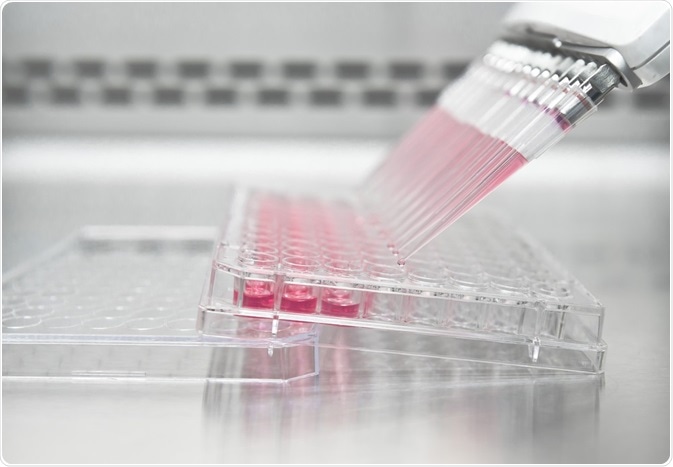HEK293 Cells: Applications and Advantages
Human embryonic kidney 293 (HEK293, HEK-293, or HEK) cells are one of the most common cell lines used for research purposes, second only to HeLa cells. Their popularity is due to several properties such as easy maintenance, robustness, and ease of transfection.

The history of HEK293 cells
The HEK293 cell line was initially produced in 1973 by a team led by Alex van der Eb in Leiden (Netherlands) from normal fetal human embryonic kidney cells. These cells were created following transfection with sheared adenovirus 5 DNA, leading to the incorporation of some of the adenoviral genome into the human chromosome 19 of the fetal cell’s genome. The name 293 comes from the fact that it was Frank Graham’s (one of van de Eb’s postdoc) 293rd experiment.
These cells were initially thought to originate from an endothelial, epithelial, or fibroblastic cell from the fetal kidney. However, recent evidence into the cellular characteristics of HEK293 cells has led to the suggestion that they may actually originate from a neuronal fetal kidney cell.
Following sequencing studies, it has also been identified that these cells have a very complicated karyotype, with multiple copies of chromosomes. For example, these cells have four copies of chromosome 17. It has also been established that these cells do not have a single Y chromosome – but have three X chromosomes – suggesting that the fetus from which they were obtained was a female.
Advantages of HEK293 cells
HEK293 cells are frequently utilized in research for several reasons. Firstly, they are very easy to grow and to maintain, with high reproducibility, which makes them preferable over other less-robust and slow-growing cell lines.
Furthermore, they are very efficient at protein production and accessible for transfection. Through the insertion of plasmid vectors, the cell’s synthetic protein machinery can be influenced to make the transfected protein, utilizing the inserted genetic information.
Applications of HEK293 cells
These cells have been widely used in research. For example, they have been used to analyze the effect of drugs on sodium channels, the interactions between different proteins and to produce proteins and drugs.
For example, this cell line was transfected with a recombinant activated protein C, which was then synthesized, isolated, and later tested for the treatment of sepsis. This example, therefore, demonstrates the effectiveness of this cell line in the expression of novel proteins. Furthermore, these cells can be used for adenoviral vector proliferation as they contain several adenoviral genes but lack the dangerous key viral genes (E1 and E2) making the produced vectors much safer.
The continuing development of HEK293 cells
A recent development has led to the production of a HEK293 cell line variant, called HEK 293T. This slightly different cell line contains the SV40 Large T antigen. Ultimately, this means that transfected SV40-containing plasmids can undergo episomal replication, which enhances the amount of recombinant protein/retroviral production.
Ubigene Biosciences is co-founded by biological academics and elites from China, the United States, and France. We are located in Guangzhou Science City, which serves as a global center for high technology and innovation. Ubigene Biosciences has 1000㎡ office areas and laboratories, involving genome editing, cell biology technology, and zebrafish research. We provide products and services for plasmids, viruses, cells, and zebrafish. We aim to provide customers with better gene-editing tools for cell or animal research.
We developed CRISPR-U™ and CRISPR-B™ (based on CRISPR/Cas9 technology) which is more efficient than general CRISPR/Cas9 in double-strand breaking, CRISPR-U™ and CRISPR-B™ can greatly improve the efficiency of homologous recombination, easily achieve knockout (KO), point mutation (PM) and knockin (KI) in vitro and in vivo.
Genome Editing Platform
——Focusing on the Application of CRISPR-U™ and CRISPR-B™ Gene Editing Technology
1. Provides various types of gene-editing vectors for different species.2. Provides different virus packaging services, including lentiviruses, adenoviruses and adeno-associated viruses.3. Provides high-quality services for gene knockout, point mutation and knockin cell lines.
Cell Biology Platform
——Focusing on primary cell
1. Provides over 400 types of primary cells.2. Provides culture strategies and related products for different cell types.3. Provides cell biology-related services such as cell isolation, extraction and validation.






